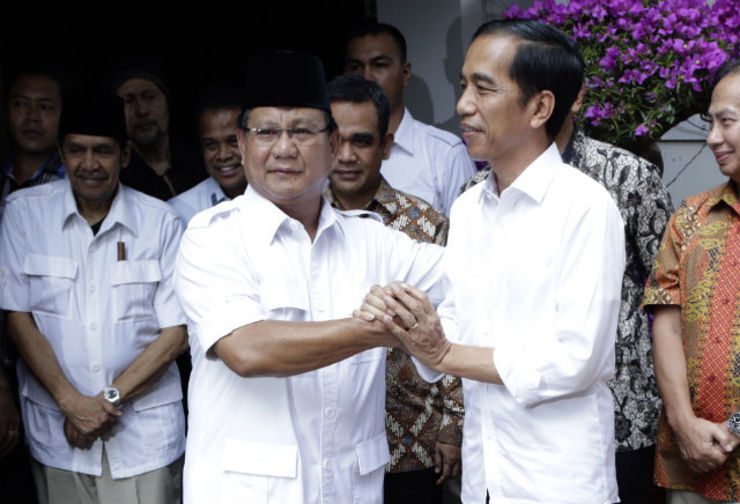SUMMARY
This is AI generated summarization, which may have errors. For context, always refer to the full article.

JAKARTA, Indonesia – First, Prabowo Subianto, the former general, saluted the man who deafeated him at the presidential elections. Then, he finally congratulated President-elect Joko “Jokowi” Widodo, and said he would ask his supporters to support Indonesia’s next president.
These were unexpected outcomes from a meeting on Friday, October 17, that few thought was possible, given the intense animosity between the two camps in the wake of Indonesia’s most divisive election in history. But they’re outcomes that are cheering Indonesia’s slumping markets.
Prabowo’s brother, business tycoon Hashim Djojohadikusomo, said back in August “there would be no reconciliation” with Jokowi, who they said betrayed his promise not to run for president.
But in a televised press conference on Friday, the ex-general described the meeting at his father’s home in South Jakarta as “full of friendship.”
“I conveyed to the party that I lead, my friends and supporters, to back Jokowi and his government,” said Prabowo, who had not made a public appearance since the Constitutional Court threw out his challenge to the election results in August.
However, he added: “If there’s some things which are not for the benefit of our nation and people, we will not hesitate to criticize.”
Jokowi said in response: “Our goals are the same…everything is for the sake of the nation.”
He also welcomed Prabowo’s willingness to criticize policies he disagreed with: “A balance in the management of the country is very important. There are some who execute, some who control, and some who criticize. I see that as a good thing.”
Easing political tensions
The meeting is part of Jokowi’s attempts to court the leaders of the opposition, which many fear would obstruct his plans and programs over the next 5 years, ahead of his inauguration on Monday, October 20.
On Tuesday, October 14, Jokowi met with Aburizal Bakrie, the chairman of Golkar Party, which has the largest faction in the opposition-controlled legislature. Though Aburizal said Golkar would stay with Prabowo’s Red and White Coalition (KMP), he said they also “agreed to build a better Indonesia.”
There are also strong indications that the United Development Party (PPP), one of the smaller opposition parties, would join Jokowi’s coalition after the President-elect’s party, PDI-P, offered it a leadership position at the People’s Consultative Assembly (MPR). Jokowi was later quoted as saying there would likely be a seat for PPP in his Cabinet.
All these moves are being interpreted as the “maturing” of Jokowi, who has little experience in national-level politics. He famously campaigned that he would not trade ministerial seats for political support and insisted a majority opposition was not an issue, but the weeks between his election victory and inauguration saw his camp repeatedly defeated in the legislature.
Prabowo’s backers used their majority to win key positions in the legislature and voted to abolish the direct election of local leaders, a measure Jokowi had opposed and which rolled back a key democratic reform of the post-Suharto era.
Market impacts
Friday’s meeting was organized quickly, with PDI-P politician Aria Bima telling reporters he delivered Jokowi’s meeting invitation on Thursday to Prabowo. While it’s clear why Jokowi needed the meeting, it’s less evident why Prabowo would agree to it.
There is, after all, precedent in Indonesia for holding long-term grudges against political opponents. Megawati Sukarnoputri, the chairwoman of PDI-P, has infamously refused to meet with outgoing President Susilo Bambang Yudhoyono after the latter ran for president and defeated her in 2004 despite promises not to do so.
But Yuventius Nicky, an editor an business intelligence site YosefArdi.biz, said the reason could lie in the large nexus between Indonesian politics and business. “Many of the people behind Prabowo have businesses that could be suffering from the decline in investor confidence and drop in the rupiah’s value resulting from the political uncertainty,” he said.
The Jakarta Composite Index (JCI), which tends to rise and fall with Jokowi’s political fortunes, lost 4.5% in the 3 weeks preceding October 10, according to the Wall Street Journal. It closed 1.56% higher on Friday – the biggest increase since July 7 – as the Prabowo-Jokowi meeting “spurred buying in local stocks,” according to YosefArdi.biz.
The rupiah, which last week hit its lowest level in 8 months, strengthened 1.2% – also the most since July 7 according to Bloomberg – to 12,108 per dollar.
“Prabowo realized all this vitriol isn’t productive,” Yohanes Sulaiman, a political expert at the Indonesian Defense University, also said. – with a report from Agence France-Presse/Rappler.com
Add a comment
How does this make you feel?
There are no comments yet. Add your comment to start the conversation.